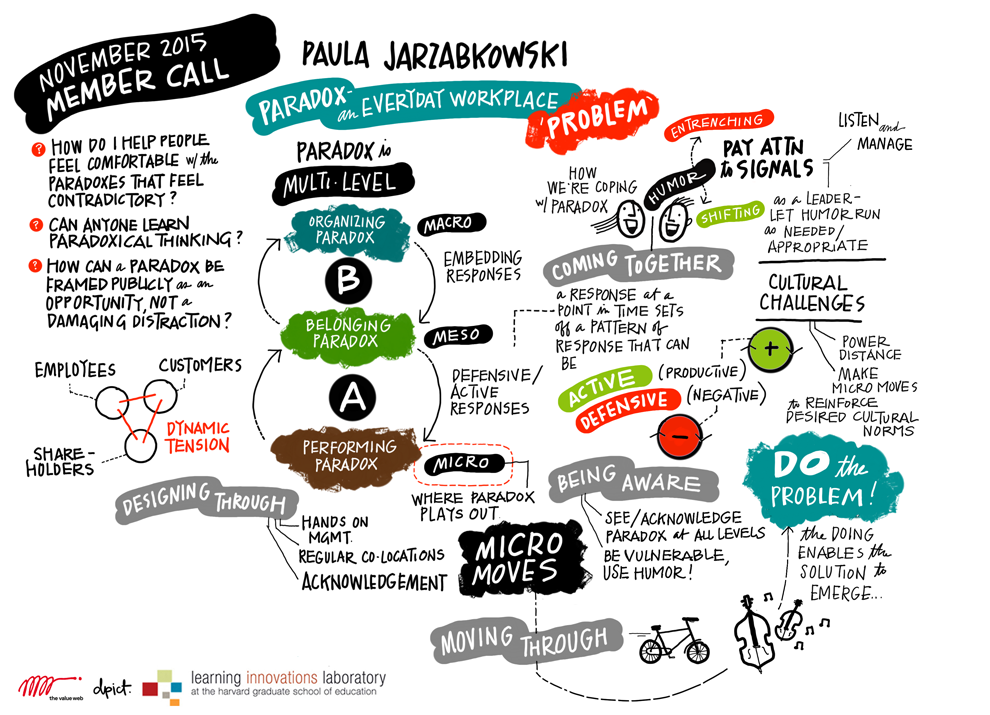 Dr. Jarzabkowski Professor in Strategic Management at the Cass Business School at the City College of London joined the November 2015 member call and shared her research on paradox and how micro-moves such as humor can help navigate paradoxes in organizations. Below is a summary of the ideas that Paula shared with the LILA Community.
Dr. Jarzabkowski Professor in Strategic Management at the Cass Business School at the City College of London joined the November 2015 member call and shared her research on paradox and how micro-moves such as humor can help navigate paradoxes in organizations. Below is a summary of the ideas that Paula shared with the LILA Community.
Paradox may not be a problem, but it very often is in organizations. This presentation will address:
- Ways paradox can be more of a problem
- How we can try to prevent that problem
Studying Paradox in Telco
Paula began by sharing a case study of major telecommunications company. Telco was the most differentiated service provider in industry and biggest market share, but was declared anti-competitive because they had historical advantage of being built up as a state provider (eg fiber cables)
- Government declared a Chinese wall, to force telco to ignore all high-value assets that give them market power, in order to treat customers fairly; separate branding, separation of each product and service
- Paradox: How to treat both customers and shareholders fairly?
Ethnography: What and why?
Ethnography = “fly on the wall” approach; observing by being there
- Naturally occurring experiment, which allows us to bring familiar patterns to the surface and make them strange in this way (example of Native American rain dance), in order to understand their functions, their purpose within the company; helps them to understand how to preserve the good and cut out the bad in these patterns
Paradox is Multi-Level
- Organizing Paradox: regulator says company will be split into different divisions by Chinese wall; some companies create these divisions themselves, thinking it will help people focus on their goals – but it will also create divisions and competitions in between
- Belonging Paradox: which groups do I identify with? Will create stress for workers because individual roles become conflicted – do I help this person or become political and refuse to help them?
Active and defensive paths
Your dealing with the paradox today will have an impact on things tomorrow, a chain of responses; if you don’t manage these well, you’ll end up in a vicious cycle.
- Engineers belong to a new division behind the wall. When they go to houses to fix problems, the people who would have let in the telco brand because it was familiar, now wouldn’t let in the new division because it was no longer familiar.
- Telco says that issues created by Chinese wall are not fair, as repercussions of the new brand non-recognition negatively impacts their business; everyone is technically doing the right thing but it’s not working!
- “Suppressing” – this is a problem but we’re going to stick blindly to our goals and avoid the paradox
- Top managers need to come in at micro level to help solve the problem
- New way of house service provider introducing himself: “I’m from distribution, which is a division of Telco, and I’m here on behalf of service provider X or Y” – legal and sensible; minor change but helps them resolve the paradox in their roles, which will resolve the paradox in the goals
Defensive and Active Paths
Diagram: how to avoid getting stuck on the defensive path and instead take the active path; am I exacerbating the problem or trying to create resolution to help people manage the everyday paradox in their lives?
So Why is Paradox so Funny?
- The Telco people were laughing all the time about the paradox! So this must contribute to how they deal with the paradox
- Laughter/humor = often a response to incongruity; allows us to reconstruct a relationship between the two incongruous things; Can generate a healthier response to paradox
What humor does in paradoxical situations
- Example of when Telco put in place a matrix structure, that went contrary to the system in place: divisions needed to coordinate but could not coordinate due to the Chinese wall
- Middle managers began laughing about it; at first, they were quite negative, and then began to joke about it, which eventually convinced them that they did in fact have to bring the problem to management with a suggested solution
- Humor signaled that this thing is causing me to experience tension, is a paradox for me; something that could otherwise be individual (it’s just my paradox) becomes a shared experience; jokes allow people to suggest ideas in a funny way and test them out for traction in peer group; once laughter and ideas shared, confidence to act is gained
Paradoxical Conditions, Entrenching and Shifting Paths
So What?
- All organizations are paradoxical; this telco is a prime example
- This org had its response imposed upon it, but others choose to create these divisions themselves and in doing so create paradoxes.
- You have choices in how to manage this situation, with either active responses that address paradoxes or defensive responses that exacerbate them.
- Paradoxical tensions will continuously recur, we’ll slip back into them and need to be brought back with an active response
- Be attentive to the micro coping behaviors, like humor, of people
Click Here to listen to the audio from the presentation.
![]() For a full transcript of the presentation including the questions raised after the presentation, download the summary document.
For a full transcript of the presentation including the questions raised after the presentation, download the summary document.
